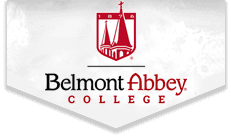- The structure, function, and evolution of organisms, concentrating on their interrelationships, development, and genetics as well as characteristics of plants and habits of animals.
- Our program prepares students for a variety of careers in the life sciences including medical, veterinary, nursing, physical therapy, etc.
You should consider the Abbey’s Biology & Biochemistry degree programs if you:
- have strong science and math skills
- enjoy lab work
- have a desire to understand the structure and function of living organisms
Our rigorous Biology & Biochemistry programs will challenge and prepare you:
- Study Biology & Biochemistry in a department with an outstanding record of acceptance into medical, veterinary medical, and graduate schools.
- Build practical experience with in-depth labs and excellent internship opportunities.
Students pursuing a Biology & Biochemistry bachelors degree at Belmont Abbey College are strongly encouraged to pursue summer internship and research opportunities to broaden their base of knowledge and experience.
With a bachelors degree from Belmont Abbey College, you will be able to pursue a variety of opportunities, including:
- medical school
- veterinary school
- dental school
- physical therapy
- teaching biology
- environmental protection
- forensic medicine
- other allied medical professions
- pursue graduate studies in biology
An accredited B.A. or B.S. degree from Belmont Abbey College demonstrates the ability to craft oral and written presentations backed by rigorous in-class study. Here we will help you cultivate the skills necessary to enter into graduate and professional programs or the workplace.
The Abbey Difference:
“Fitness for the world”
The Biology & Biochemistry Department educates students in the discipline within the context of the Catholic Benedictine Liberal Arts tradition. In doing so, we understand biology as the study of life and life processes. Such knowledge constitutes a vital part of that liberal learning whose goal, as John Henry Newman noted, is “fitness for the world”. We aim for the study of Biology to help students assess the many issues that face today’s world, enabling them to become responsible citizens and to promote the common good.
Scientific grounding in ethical issues
The department provides students with an appreciation of the organization, evolution, and interrelationships of organisms, understanding of the techniques, goals, and limits of science as a process, and valuable laboratory experience. We hope this study will help students become good citizens who can effectively participate in society. Increasingly, the ethical questions that society is debating are rooted in science, so that to participate in the debate and to make informed decisions, students must first understand the underlying science.
Program Requirements
(This option is available for traditional students only.)
In addition to the other Core Curriculum requirements, the following are specific core requirements:
- BI 101 General Biology
- MA 151 College Algebra
- PY 201 Physics I
Major requirements:
- BI 201 Cell Biology
- BI 215 Research Methods in Biology
- BI 231 Organismal Diversity
- BI 300 Genetics
- BI 310 Animal Physiology or BI 361 Human Physiology
- BI 326 Plant Ecology or BI 403 Ecology
- BI 407 and 408 Coordinating Seminars I, II
- CH 105 and 106 General Chemistry I, II
Other courses:
- 300-400 level Biology electives (excluding internships, if taken) – 12 hours
- General elective hours – 20-23 hours
To be eligible for acceptance into the B.A. or B.S. degree program, the student must have completed BI 101, BI 201, and BI 231, and must have earned a numerical average of at least a “70” or better in all three (3) courses.
Students must have at least a “C” average in all of their biology courses to graduate with a degree in Biology.
Students transferring more than 13 credit hours to Belmont Abbey College are not required to take the First-Year Symposium.
Credits earned through internships are not counted toward the major. They are counted as elective hours toward graduation and are graded on a pass/fail basis.
It is the student’s responsibility to see that all degree requirements for graduation are fulfilled.
(This option is available for traditional students only.)
In addition to the other Core Curriculum requirements, the following are specific core requirements:
- BI 101 General Biology (required)
- MA 151 College Algebra (required)
- PY 201 Physics I (required)
Major requirements:
- BI 201 Cell Biology
- BI 215 Research Methods in Biology
- BI 231 Organismal Diversity
- BI 300 Genetics
- BI 310 Animal Physiology or BI 361 – Human Physiology
- BI 407 and BI 408 Coordinating Seminars I and II
- BI 326 Plant Ecology or BI 403 Ecology
- CH 105 and CH 106 General Chemistry I and II
- CH 221 and 222 Organic Chemistry I and II
- MA 208 Statistics
- PY 102 Physics II
Electives:
- 300-400 level biology electives (excluding internships, if taken) – 12 hours
- General elective hours – 0-2 hours
Credits earned through internships are not counted toward the major. They are counted as elective hours toward graduation and are graded on a pass/fail basis.
To graduate with a degree in Biology, students must attain a “C” average calculated over all of their Biology courses and must pass a Department comprehensive examination given in their senior year.
It is the student’s responsibility to see that all degree requirements for graduation are fulfilled.
In addition to the other Core Curriculum requirements, the following are specific core requirements:
- BI 101 General Biology (required)
- MA 201 Calculus I (required)
- CH 105 General Chemistry I (required)
Major requirements:
- BI 201 Cell Biology
- BI 215 Research Methods in Biology
- BI 300 Genetics
- BI 308 or BI 422 Microbiology or Molecular
- BI 407 and BI 408 Coordinating Seminars I and II
- CH 106 General Chemistry II
- CH 221 and 222 Organic Chemistry I and II
- CH 317 Analytical Chemistry
- BC 316 Biochemistry
- MA 202 Calculus II
- PY 201 and 202 Physics I, II
Other Courses:
- TH 332 Bioethics in Catholic Tradition
- General elective hours – 6 hours
Credits earned through internships are not counted toward the major. They are counted as elective hours toward graduation and are graded on a pass/fail basis.
It is the student’s responsibility to see that all degree requirements for graduation are fulfilled.
Minor requirements:
- Fifteen (15) credits of biology at the 200-level or above.
The preponderance of the hours must be taken at Belmont Abbey College.
It is the students responsibility to see that all degree requirements for graduation are fulfilled.
Program Requirements:
- BI 213 Organismal Diversity
- BI 326 OR 403 Plant Ecology or Ecology
- EV 300 Environmental Science
- EV 350 Environmental Issues
For students who did not satisfy the core curriculum physical science requirement with CH 105, CH 105 is a required prerequisite for the minor.
The preponderance of the hours for the minor in Environmental Science must be taken at Belmont Abbey College.
It is the student’s responsibility to see that all degree requirements for graduation are fulfilled.
- Pre-Med
- Completion of required and certain elective courses provides the biology graduate with all the courses normally needed to enter medical school.
- Pre-Dentistry
- Completion of required and certain elective courses provides the biology graduate with all the courses normally needed to enter dentistry school.
- Pre-Pharmacy
- Completion of required and certain elective courses provides the biology graduate with all the courses normally needed to enter pharmacy school.
- Physical Therapy/Physician Assistant
- Completion of required and certain elective courses provides the biology graduate with all the courses normally needed to enter physical therapy or physician assistant school.
- Pre-Veterinary
- Completion of required and certain elective courses provides the biology graduate with all the courses normally needed to enter veterinary school, apart from an Animal Nutrition course usually taken through consortium.
- Students in our Pre-Professional Pathways have gone onto institutions such as: Duke, Oxford, Johns Hopkins, NC State, Florida State and Eastern Carolina University.
Biology Courses:
The Biology Department maintains the Tau Upsilon Chapter of Beta Beta Beta National Biological Honorary Society. Students who meet the criteria are inducted in a ceremony each year. Tri-Beta, as it is known, sponsors speakers, a road clean-up twice a year as part of the adopt a highway program, and other activities. The Department has a small scholarship fund from which it offers some support to outstanding Biology juniors and seniors. Those students also serve as undergraduate laboratory assistants in the general biology labs.
Faculty:
Dr. Heather Ayala
Chair of the Biology Department and Associate Professor of Biology
B.S., Azusa University
Ph.D., University of Notre Dame
Dr. Mike McLeod
Professor of Biology and Coordinator of the Environmental Studies Concentration
B.S., Lincoln Memorial University
M.A., East Tennessee State University
Ph.D., Miami University (Ohio)
Dr. Tim Polnaszek
Assistant Professor of Biology
B.S., North Dakota State University
Ph.D., University of Minnesota
Postdoctoral research, University of Arizona
Dr. Jennifer Ellington
Associate Professor of Biology
B.S., Siena College
M.S., University of North Carolina-Charlotte
Ph.D., Wake Forest University
Dr. Robert Tompkins
Associate Professor of Biology
A.A.S., Rutledge College
B.S., Guilford College
M.S., North Carolina State University
Ph.D., Clemson University
Dr. Meredith Bostrom
Assistant Professor of Biology
B.S., Long Island University
M.S., The College of William and Mary
Ph.D., University of Kentucky
Highlights of your experience:
Dr. Mike McLeod – I am a broadly trained biologist with specific research interests in population and biochemical genetics and physiological ecology. I am a board registered cytotechnologist who has worked in hospital labs, play the bagpipes, an amateur historian of World War II in the Pacific, a sometimes thespian, a father and husband. I came to Belmont Abbey because I love teaching and working with undergraduate students. The Abbey has afforded me an environment where I can pursue my research interests when time permits as well as my other varied interests and continue to learn about subjects that fascinate me.
Some Medical School Biology Graduates Go To:
- East Carolina University School of Medicine
- Tulane University School of Medicine
- Eastern Virginia Medical School
- Oxford University Medical School
- The University of Buffalo School of Medicine
- The Medical College of South Carolina
- The New England College of Osteopathic Medicine
- The Philadelphia College of Osteopathic Medicine
- The University of Florida
- The University of North Carolina- Chapel Hill School of Medicine
- The University of South Carolina School of Medicine at Columbia
- Wake Forest University School of Medicine




